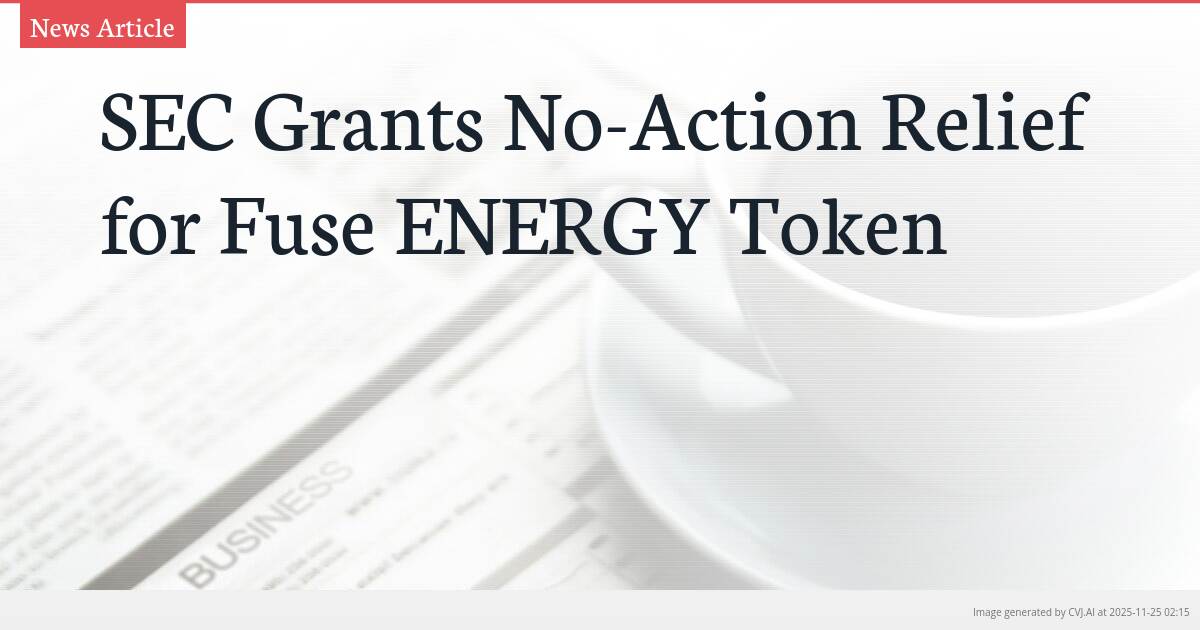Introduction
In a landmark decision that provides crucial regulatory clarity for the cryptocurrency industry, the U.S. Securities and Exchange Commission has granted no-action relief to Fuse Crypto Limited, allowing the London-based energy-technology company to offer and sell its ENERGY token without registration. This ruling represents one of the clearest examples yet of the SEC distinguishing between utility tokens and investment products, following months of productive engagement between Fuse and the securities regulator that culminated in Monday’s announcement.
Key Points
- SEC's no-action relief applies specifically to Fuse's token structure as described in its November 19 submission
- The ENERGY token rewards households for operating distributed energy resources like solar panels and EV chargers
- SEC determined the token functions as a rebate for energy-efficiency participation rather than an investment product
A Regulatory Breakthrough for Utility Tokens
The SEC’s Division of Corporation Finance stated in its response to Fuse’s November 19 no-action request that it would not recommend enforcement action if the company offers and sells its Solana-based ENERGY token without registration, provided Fuse adheres strictly to the token structure described in its submission. The agency emphasized that its position is contingent on Fuse maintaining the facts and conditions outlined in its filing, creating a carefully bounded precedent that other crypto projects will need to study closely.
Fuse Crypto Limited, which operates distributed-energy programs across the U.S. and Europe, described the decision as “a win for U.S. crypto clarity” and “the result of months of productive engagement with the SEC.” The company expressed pride in “playing a role in pushing forward regulatory clarity for crypto in the U.S.,” noting in a statement on X that “the momentum is building” for clearer digital asset regulation.
How the ENERGY Token Avoids Security Classification
Central to the SEC’s decision was Fuse’s demonstration that the ENERGY token functions as a loyalty-style digital token rather than an investment product. The company’s system awards tokens to households that install or operate distributed energy resources, including rooftop solar panels, batteries, and EV chargers. Fuse successfully argued that the token operates like a rebate for energy-efficiency participation rather than representing an investment tied to the company’s performance.
London-based Fuse had detailed in its submission that the Solana-based token’s design intentionally limits speculation by capping redemption values according to the company’s profit margins and tying them to average market prices when consumers use them. This structural limitation proved crucial in the SEC’s analysis, with agency staff ultimately agreeing that the token’s value would not depend on the overall success of Fuse or the Fuse Network—a core element of the Howey test used to determine whether an asset qualifies as a security.
Industry Reaction and Legal Implications
The decision drew immediate support from prominent crypto legal experts, including Bill Hughes, a lawyer at Consensys, who characterized the outcome as predictable given the token’s design. “There is not a lawyer in crypto that would have thought this token was a security,” Hughes wrote on X, describing the matter as an “easy case” given the factors cited by the SEC in its determination.
This ruling provides one of the most explicit regulatory distinctions between utility tokens and securities to date, offering valuable guidance for other cryptocurrency projects seeking to navigate U.S. securities laws. The SEC’s careful framing of its position—conditioned specifically on Fuse maintaining the described token structure—creates a template that other companies can study when designing their own token ecosystems, particularly those focused on loyalty rewards and consumer incentives rather than investment returns.
While the decision represents significant progress for regulatory clarity, it also underscores the SEC’s case-by-case approach to digital asset classification. The agency’s emphasis on the specific facts and conditions of Fuse’s token structure suggests that similar relief would require other projects to demonstrate comparable limitations on speculation and clear utility functions divorced from corporate performance.
📎 Source reference: decrypt.co

